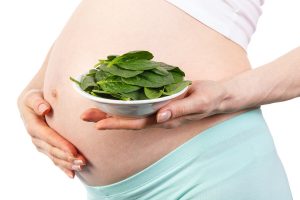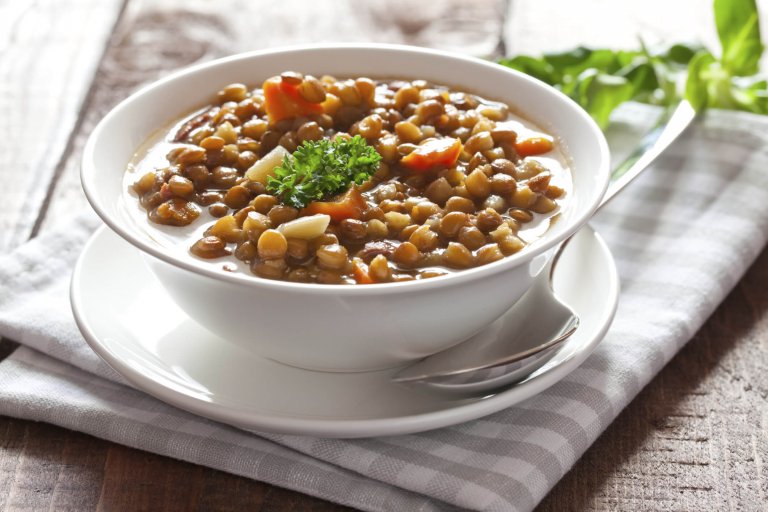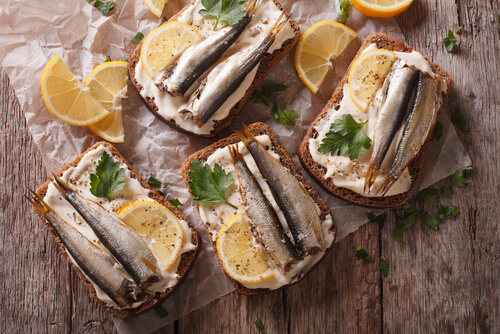6 Iron-Rich Foods for Pregnant Women


Written and verified by the nutritionist Saúl Sánchez Arias
Iron-rich foods are essential for pregnant women. In fact, a pregnant woman’s body needs twice as much iron since it is essential for the additional red blood cells that the body creates for the baby. These are responsible for transporting oxygen to organs and tissues, as well as to the fetus.
Certainly, iron is important throughout pregnancy, although it’s even more crucial in the first and third trimesters. This is because your body actually doesn’t produce iron and must get it mainly from food.
There are two types of iron: heme and non-heme. The first is found only in animal sources and it is easier for the body to absorb. On the other hand, non-heme iron is found in plants, iron-fortified foods and supplements.
Also, red meat, poultry and fish are some of the best sources of iron. If your diet doesn’t include animal protein, you can get iron from legumes, vegetables and cereals.
Why Do You Need Iron During Pregnancy?
Here are some reasons why you need iron during pregnancy:
- It’s essential to make hemoglobin, the protein in red blood cells that carries oxygen to other cells.
- Iron is an important component of myoglobin, collagen and many enzymes.
- It helps maintain a healthy immune system.
- The amount of blood in your body increases during pregnancy, until you have almost 50% more blood than normal. Consequently, additional iron is needed to produce more hemoglobin.
- Additional iron is needed for the growing baby and the placenta, especially in the second and third trimesters.
- Anemia during pregnancy is associated with preterm birth and low birth weight.

6 Iron-Rich Foods for Pregnant Women
To treat iron deficiency naturally during pregnancy, here are some food options:
1. Nuts
Nuts provide an incredible source of non-heme iron, as they help to increase levels in the body easily and efficiently. Pistachios, cashews, pine nuts, hazelnuts, peanuts, toasted almonds and apricot nuts are some of the best sources of iron you can find in the market.
2. Spinach
Spinach is one of the most nutritious vegetables. It’s loaded with non-heme iron and many other essential nutrients for health. As one of the main vegetable sources of iron, spinach is delicious raw or cooked.
3. Sardines
Sardines are probably best known for their high concentration of omega-3 and vitamin D. However, they also provide an important source of heme iron.
“It is essential to make hemoglobin, the protein in red blood cells that carries oxygen to other cells.”
4. Dark Chocolate
When you buy high quality dark chocolate, not only do you satisfy your cravings, but you also give your body a significant dose of non-heme iron. In addition, it contains other nutritional components such as magnesium, calcium, phosphorus and potassium. It’s a perfect and delicious healthy dessert option!
5. Lentils
Lentils are one of the foods most popularly known for their extra contribution of iron. This type of legume has a really impressive amount of non-heme iron.
In addition to its high supply of nutrients, it’s a very economical, versatile and fundamental food for good physical and mental development.

6. Spirulina
Spirulina is one of the foods rich in iron for pregnant women that shouldn’t go unnoticed. It’s a greenish algae known for its intense flavor and its powerful nutritional profile.
When it comes to non-heme vegetarian iron sources, spirulina is undoubtedly one of the most outstanding. In addition, it’s also rich in essential amino acids, proteins, and vitamins B, C, D and E.
Finally, remember that iron is an important mineral to include in your pregnancy diet. Therefore, don’t forget that iron-rich foods for pregnant women are compatible with the baby’s developing brain and help maintain a healthy supply of oxygen in the blood.
Iron-rich foods are essential for pregnant women. In fact, a pregnant woman’s body needs twice as much iron since it is essential for the additional red blood cells that the body creates for the baby. These are responsible for transporting oxygen to organs and tissues, as well as to the fetus.
Certainly, iron is important throughout pregnancy, although it’s even more crucial in the first and third trimesters. This is because your body actually doesn’t produce iron and must get it mainly from food.
There are two types of iron: heme and non-heme. The first is found only in animal sources and it is easier for the body to absorb. On the other hand, non-heme iron is found in plants, iron-fortified foods and supplements.
Also, red meat, poultry and fish are some of the best sources of iron. If your diet doesn’t include animal protein, you can get iron from legumes, vegetables and cereals.
Why Do You Need Iron During Pregnancy?
Here are some reasons why you need iron during pregnancy:
- It’s essential to make hemoglobin, the protein in red blood cells that carries oxygen to other cells.
- Iron is an important component of myoglobin, collagen and many enzymes.
- It helps maintain a healthy immune system.
- The amount of blood in your body increases during pregnancy, until you have almost 50% more blood than normal. Consequently, additional iron is needed to produce more hemoglobin.
- Additional iron is needed for the growing baby and the placenta, especially in the second and third trimesters.
- Anemia during pregnancy is associated with preterm birth and low birth weight.

6 Iron-Rich Foods for Pregnant Women
To treat iron deficiency naturally during pregnancy, here are some food options:
1. Nuts
Nuts provide an incredible source of non-heme iron, as they help to increase levels in the body easily and efficiently. Pistachios, cashews, pine nuts, hazelnuts, peanuts, toasted almonds and apricot nuts are some of the best sources of iron you can find in the market.
2. Spinach
Spinach is one of the most nutritious vegetables. It’s loaded with non-heme iron and many other essential nutrients for health. As one of the main vegetable sources of iron, spinach is delicious raw or cooked.
3. Sardines
Sardines are probably best known for their high concentration of omega-3 and vitamin D. However, they also provide an important source of heme iron.
“It is essential to make hemoglobin, the protein in red blood cells that carries oxygen to other cells.”
4. Dark Chocolate
When you buy high quality dark chocolate, not only do you satisfy your cravings, but you also give your body a significant dose of non-heme iron. In addition, it contains other nutritional components such as magnesium, calcium, phosphorus and potassium. It’s a perfect and delicious healthy dessert option!
5. Lentils
Lentils are one of the foods most popularly known for their extra contribution of iron. This type of legume has a really impressive amount of non-heme iron.
In addition to its high supply of nutrients, it’s a very economical, versatile and fundamental food for good physical and mental development.

6. Spirulina
Spirulina is one of the foods rich in iron for pregnant women that shouldn’t go unnoticed. It’s a greenish algae known for its intense flavor and its powerful nutritional profile.
When it comes to non-heme vegetarian iron sources, spirulina is undoubtedly one of the most outstanding. In addition, it’s also rich in essential amino acids, proteins, and vitamins B, C, D and E.
Finally, remember that iron is an important mineral to include in your pregnancy diet. Therefore, don’t forget that iron-rich foods for pregnant women are compatible with the baby’s developing brain and help maintain a healthy supply of oxygen in the blood.
All cited sources were thoroughly reviewed by our team to ensure their quality, reliability, currency, and validity. The bibliography of this article was considered reliable and of academic or scientific accuracy.
- Abioye A. I, Okuneye T. A, et al. Calcium intake and iron status in human studies: a systematic review and dose-response meta-analysis of randomized trial and crossover studies. The Journal of Nutrition. Marzo 2021. 151 (5): 1084-1101.
- Agencia Española de Seguridad Alimentaria y Nutrición (AESAN). Recomendaciones de consumo de pescado por presencia de mercurio. 2019.
- American Institute for Cancer Research. Limit consumption of read and processed meat.
- He H., Qiao Y, Zhang Z., Wu Z., et al., Dual action of vitamin C in iron supplement therapeutics for iron deficiency anemia: prevention of liver damage induced by iron overload. Food Func, 2018. 9 (10): 5390-5401.
- Institute of Medicine (US). Committee on Nutritional Status During Pregnancy and Lactation. Nutrition during Pregnancy: part I weight gain. Part II nutrient supplements. Washington (DC): National Academies Press (US); 1990.
- Mayo Clinic. Embarazo semana a semana. Anemia por deficiencia de hierro durante el embarazo: consejos de prevención. Abril 2022.
- National Institutes of Health. Office of Dietary Supplements. Hierro. U. S. Department of Health and Human Services. Abril 2022.
- National Health Service (NHS). Meat in your diet. National Health Service of Scotland. Junio 2021.
- Ried K., Fakleer P., Stocks NP., Effect of cocoa on blood pressure. Cochrane Database Syst Rev, 2017.
- Queensland Gouvernement. Iron for Pregnant Women. Consensus Document from Dietitians/Nutritionists from the Nutrition Education Materials on line (NEMO). Junio 2020.
This text is provided for informational purposes only and does not replace consultation with a professional. If in doubt, consult your specialist.








